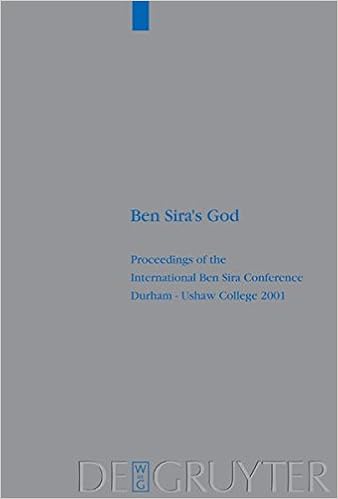
By Renate Egger-Wenzel
ISBN-10: 3110175592
ISBN-13: 9783110175592
Die Rede von Gott im Buch Ben Sira wird vor alt- und neutestamentlichem Hintergrund beleuchtet. Der Tagungsband enthält sowohl übergreifende als auch exegetische Einzeluntersuchungen zur Thematik. Ein Ausblick auf die jüdische Wirkungsgeschichte rundet das Bild ab. Der Anhang bietet neben Einzeluntersuchungen auch different Berichte im Zusammenhang des Buches Ben Sira und eine Corrigendaliste zur Textausgabe von %. Beentjes.
What is expounded approximately God in Ben Sira is illuminated opposed to previous and New testomony history. This quantity of lawsuits includes separate overarching and exegetic reviews at the subject material. A large attention of Jewish effect all through heritage rounds out the image. as well as person experiences, the appendix deals quite a few experiences on the subject of Ben Sira and a listing of errata for the version by means of P. C. Beentjes.
Read Online or Download Ben Sira's God: Proceedings of the International Ben Sira Conference, Durham — Ushaw College 2001 PDF
Best sacred writings books
New PDF release: The Passionate Torah: Sex and Judaism
During this designated choice of essays, a few of ultra-modern smartest Jewish thinkers discover a large variety of primary questions that allows you to stability historical culture and glossy sexuality. within the previous couple of many years a couple of factors—post-modernism, feminism, queer liberation, and more—have introduced dialogue of sexuality to the fore, and with it a complete new set of questions that problem wide-spread traditions and methods of considering.
Head, Eyes, Flesh, and Blood: Giving Away the Body in Indian by Reiko Ohnuma PDF
Head, Eyes, Flesh, and Blood is the 1st accomplished research of a significant narrative subject matter in premodern South Asian Buddhist literature: the Buddha's physically self-sacrifice in the course of his prior lives as a bodhisattva. carrying out shut readings of reports from Sanskrit, Pali, chinese language, and Tibetan literature written among the 3rd century B.
Text-critical and Hermeneutical reports within the Septuagint is the identify of a bilateral examine undertaking performed from 2009 to 2011 through students from the colleges of Munich (Germany) and Stellenbosch (South Africa). The joint learn firm used to be rounded off through a convention that came about from thirty first of August - second of September 2011 in Stellenbosch.
- A guide to the Dead Sea scrolls and related literature
- The Bible and the Dead Sea Scrolls: Vol 1: Scripture and the Scrolls
- The Vanishing Hebrew Harlot: The Adventures of the Hebrew Stem ZNH
- The Biographies of Rechungpa: The Evolution of a Tibetan Hagiography (RoutledgeCurzon Critical Studies in Buddhism)
- Lamentations Through the Centuries
- The Damascus Covenant: An Interpretation of the ''Damascus Document''
Extra resources for Ben Sira's God: Proceedings of the International Ben Sira Conference, Durham — Ushaw College 2001
Example text
Und 17,32 endet damit, dass Gott alle Menschen betrachtet, "die Staub und Asche sind". Sowohl 17,27ff wie 18,9f weisen auf die Sterblichkeit des Menschen hin. Das weisheitliche Lehrgedicht über die Mühsal des Menschen 40,1-10 präzisiert und verengt die anthropologische Perspektive ins Psychologische. Denn die im Alten Orient bekannte Rede von der Mühsal des Menschen, die von Melancholie und Pessimismus zeugt, 18 wird hier in jeder Hinsicht ins Psychologische gewendet. Das Leben 15 16 17 18 Vgl.
18 Wotyla, Misericordia, 67 (section 13). Die Furcht und die Liebe Gottes. Ein Versuch, die Ethik Ben Siras mit der des Apostels Paulus zu vergleichen Ernst Käsemann in dankbarem Gedächtnis Otto Kaiser Philipps- Universität Marburg an der Lahn 1. 1. Wenn wir im Folgenden versuchen, die Ethik Ben Siras mit der des Apostels Paulus zu vergleichen, so stellen wir das ethische Denken eines spätbiblischen jüdischen Weisen und das eines vom Pharisäer zum Apostel Jesu Christi gewordenen Mannes nicht nebeneinander, um über den einen oder den anderen den Stab zu brechen.
17,1 lautet: "Der Herr erschuf aus Erde den Menschen, und er lässt ihn wiederum zur Erde zurückkehren". Und 17,32 endet damit, dass Gott alle Menschen betrachtet, "die Staub und Asche sind". Sowohl 17,27ff wie 18,9f weisen auf die Sterblichkeit des Menschen hin. Das weisheitliche Lehrgedicht über die Mühsal des Menschen 40,1-10 präzisiert und verengt die anthropologische Perspektive ins Psychologische. Denn die im Alten Orient bekannte Rede von der Mühsal des Menschen, die von Melancholie und Pessimismus zeugt, 18 wird hier in jeder Hinsicht ins Psychologische gewendet.
Ben Sira's God: Proceedings of the International Ben Sira Conference, Durham — Ushaw College 2001 by Renate Egger-Wenzel
by Richard
4.2



